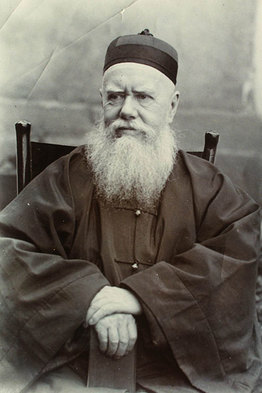 Hudson Taylor in Chinese clothing. Photo courtesy of OMF International.
Hudson Taylor in Chinese clothing. Photo courtesy of OMF International. “Unless there is an element of risk in our exploits for God, there is no need for faith.” - Hudson Taylor
James Hudson Taylor was born in 1832. His father was a Methodist lay preacher, but the young Hudson turned from the Christian faith until the age of 17, when he was converted after reading a religious tract. In 1849 he determined to go to China as a missionary and began to read widely and to study the Mandarin Chinese language in preparation.
Three years later, after receiving initial medical training and serving as a medical assistant, Taylor moved to London where he volunteered as the first missionary for the recently formed Chinese Evangelisation Society. After a hazardous five month journey Taylor arrived in Shanghai, China, on March 1, 1854. The country was engulfed in civil war, and his first year in China was fraught with difficulties. Nevertheless, Taylor persisted, and beginning in 1855 he made some eighteen preaching tours in the Shanghai region.
At first Taylor was not accepted by many Chinese who viewed him with suspicion as a foreigner. The missionary found he could overcome this difficulty by adopting Chinese clothes and hairstyle, however. He was then able to distribute many thousands of Christian tracts and portions of Scripture in Chinese in the Shanghai area.
The difficulties faced by Taylor were still considerable. When he travelled across China in 1856 his medical supplies, stored in Shanghai, were destroyed by fire, and he was robbed of nearly everything he had. The Missions Society that had sent Taylor had incessant problems and in 1857 Taylor relocated in the city of Ningbo where he began to work independently, although he was joined by the English missionary John Jones and four Chinese Christian men. It was also in Ningbo that Taylor met and married Maria Jane Dyer, who worked at a school for girls founded by one of the first female missionaries to China.
Difficulties continued. The Taylors lost their first child at an early age and in 1860, due to his own health problems, Taylor return to England with his wife and surviving daughter for needed rest and recovery. But Taylor was far from finished with his work. While in England he translating the New Testament into Ningbo dialect, he completed his medical training and in 1862, and with his wife’s help, wrote a book called China's Spiritual Need and Claims. The book was to prove influential in developing further missionary work in China, and Taylor himself founded the China Inland Mission (CIM -now OMF International).
In 1866, Taylor and his family returned to China (surviving two typhoons on the sea journey there), and worked tirelessly and with unswerving faith despite continuing difficulties. In the course of eleven trips, Taylor spent a total of 51 years in China and accomplished great works. The society he founded brought over 800 missionaries to the country and founded 125 schools as well as a great many help facilities. Because of his active campaign against the opium trade, Taylor has been called one of the most significant Europeans to visit China in the 19th Century. His missionary work was certainly of the greatest significance. It has been said that no other Christian since the apostle Paul carried out a more systematic missionary campaign over such a broad geographical area than Hudson Taylor before he died, in China, in 1905.
Throughout his life of service Hudson Taylor personified the faith that accomplishes the work of God. He encountered innumerable difficulties and setbacks in the work he did, but through faith he overcame them all. His attitude to the works produced by faith is summarized in his own words: “I have found that there are three stages in every great work of God: first, it is impossible, then it is difficult, then it is done.”
 RSS Feed
RSS Feed
